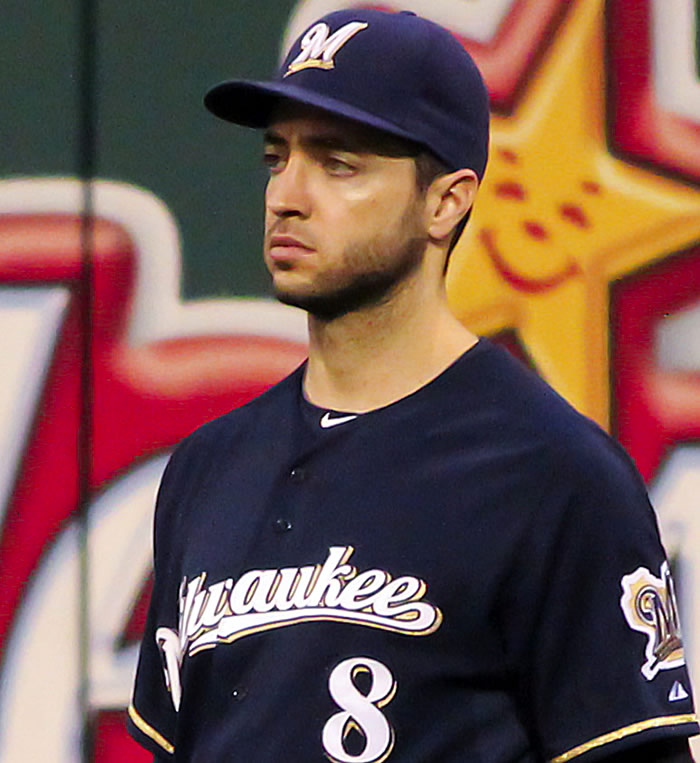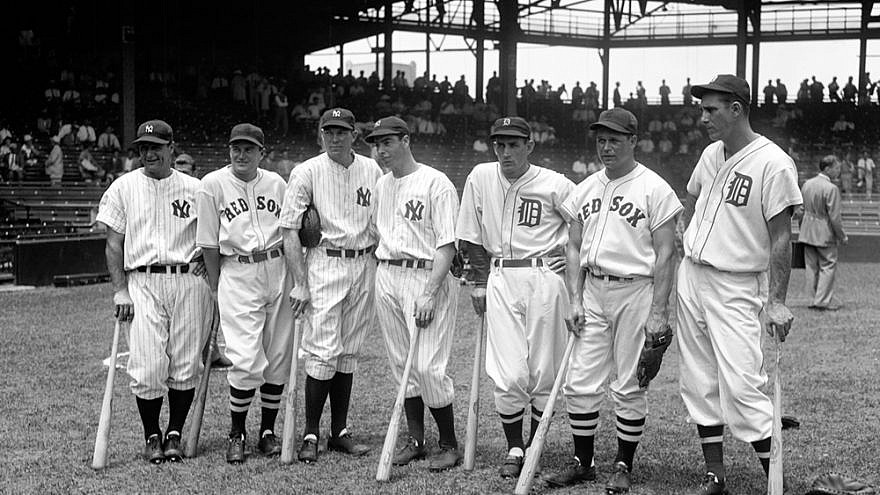The story is designed to appeal to baseball fans, as well as that curious subset of people who obsess about the role of Jews in America’s national pastime. Last week, Milwaukee Brewers outfielder Ryan Braun hit the 332nd home run of his career. That three-run blast temporarily moved him into the 108th spot on the list of Major League Baseball’s all-time home-run hitters, one ahead of Hall of Famer Henry (“Hank”) Greenberg.
According to those who keep track of these things, it made Braun the all-time Jewish home-run champion.
The question of “who is a Jew” has roiled Israel for decades as questions of ancestry and religious law interact with the realities of a modern world in which the identities of individuals often don’t conform to rules that strictly differentiate Jew from non-Jew. That’s also true for those who obsessively seek to tally the members of the tribe who make it to the big leagues.
Braun grew up in Los Angeles, the son of an Israeli Jewish father and a Catholic mother. That makes him a non-Jew according to traditional halachic definitions of Jewish law, but a Jew for those who accept patrilineal descent.
Braun was not raised as a Jew, but has said that he’s proud of his Jewish lineage and was willing to be thought of as a role model for Jewish youngsters. He was featured in the set of Jewish Major League Baseball Cards produced by the American Jewish Historical Society, and so as far as most fans are concerned, he deserves the title of the all-time Jewish home-run king.
But if he isn’t cheered in the same manner that previous generations lionized Greenberg or fellow Hall of Fame pitcher Sandy Koufax, there are two good reasons why.

One concerns the character of the men. The other is whether we really need Jewish heroes now the way we did when Greenberg played.
Part of the problem with Braun is that there will always be an asterisk on his baseball records. His Major League career began in glorious fashion by winning the National League Rookie of the Year Award in 2007 and then followed it with five consecutive All Star Game appearances. In 2011, he was named the National League’s Most Valuable Player as he led his team to the playoffs.
But a shadow was cast over his achievements when he tested positive for illegal performance-enhancing drugs at the end of his fabulous 2011 season, and he was subsequently linked to the Biogenesis Company’s ring of drug cheats the following year. Yet Braun’s disgrace was greater than just being one of many who hadn’t played fair. He disputed the positive drug test and accused the low-level league functionary tasked with transporting his test results of falsifying them. Initially, his bogus claim succeeded in avoiding a mandatory suspension. But he was eventually forced to confess and served a lengthy suspension in 2013. The spectacle of an entitled millionaire ballplayer seeking to victimize a low-wage baseball employee as Braun had done went beyond mere cheating and called into question his character.
Even worse, Braun’s career headed south after he was caught and, presumably, stopped taking steroids. Since 2013, Braun has been an above-average ballplayer, but nothing like the star he had been. While the exact impact of PEDs is a matter of speculation, the implication is that his greatest achievements were as much the product of advanced chemistry as skill and athleticism.
Still, his home runs count in the record books. But the man whose mark he surpassed will never be eclipsed as a hero to Jewish fans.
The son of Romanian Jewish immigrants, Greenberg grew up in New York and was a superstar during baseball’s golden age of great sluggers in the 1930s and 1940s, while leading the Detroit Tigers to four American League pennants and two World Series. In 1938, he challenged Babe Ruth’s seemingly insurmountable single-season home-run record, falling just two short of the magic number of 60. Though some fans felt he was cheated of the chance to break the record by pitchers who refused to pitch to him because they didn’t want a Jew to surpass the beloved Babe, Greenberg always modestly dismissed those claims.
Braun’s ability to catch him on the leaderboard was only due to the fact that Greenberg lost four-and-a-half seasons of his career due to World War II. Greenberg was the first Major Leaguer to be drafted more than a year before the United States entered the war. But after doing a year in uniform, he volunteered to go back after the attack on Pearl Harbor, serving as an officer in the U.S. Army Air Corps in the China/Burma/India Theater of operations before returning home to resume his career.
Greenberg was important to Jews in a way that Braun could never be now because his was an era of rampant anti-Semitism in which Jewish kids truly needed a hero. His willingness to stand up and identify publicly as a Jew despite the anti-Semitic smears constantly thrown in his direction by fans and rival players alike demonstrated his courage. The same was true when he refused to play in a big game on Yom Kippur and instead went to synagogue. That made him an inspiration to Jews, whether or not they cared about baseball. The same is true of Koufax a generation later, who, like Greenberg, wasn’t particularly religious but chose not to pitch in the first game of the 1965 World Series because it fell on the Day of Atonement.
By contrast, Braun always plays on Jewish holidays. Just as Greenberg symbolizes the “greatest generation” that fought in World War II, Braun is a typical assimilated American Jew of the 21st century whose ties to tradition are tenuous, with their Jewish heritage having no impact on the choices they make in their personal lives.
When Greenberg played ball, Jews struggled for acceptance in every sector of American society. Today, despite the continued virulence of the anti-Semitic virus, Jews are accepted everywhere in America. Braun is nobody’s idea of a hero, but if we prefer to think about other, more exemplary Jewish players, such as the Houston Astros’ Alex Bregman, we don’t really need them anymore in the way we once did. The symbolism of Greenberg’s achievement, coupled with his dignity and his courage, couldn’t be matched by anything a ballplayer may do in our own time.
Until someone else eventually breaks it, the Jewish home-run record is Braun’s. Yet in a real sense, it will always belong to Greenberg.


























